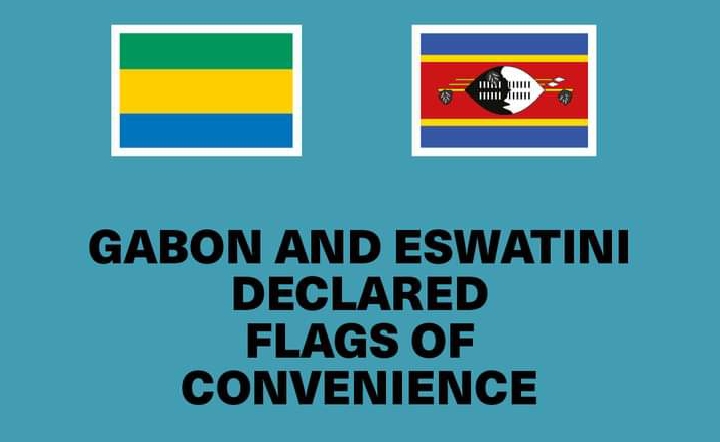By Roland Ekama
The International Transport Workers’ Federation (ITF) has included two new countries to its longstanding list of Flags of Convenience.
Two ship registries strongly associated with ‘dark fleet’ transportation – Gabon and Eswatini – are the latest additions to the ITF’s Flags of Convenience (FOC) list.
According to a statement on Wednesday, the additions are accompanied by the removal of Tonga from the 76-year-old list, bringing the total number of FOCs to 43.
“It’s a toxic industry – registering ships in countries where there is no regulation, no oversight and no accountability. It allows for exploitation and the abandonment of seafarers.
“The aim is to provide a short cut for shipowners to generate money without necessarily complying with best practice risk mitigation and due diligence through regulatory accountability said Paddy Crumlin, President of the ITF.
- Advertisement -
He said companies often register ships in low regulation countries to hide ownership, reduce tax obligations, employ cheap labour or skirt safety standards – with profound implications for seafarers working on those vessels.
He noted that 50 percent of the world fleet is registered in FOC states. The top three contributors –Panama, Liberia, and the Marshall Islands – alone account for over 40 percent of the international fleet
The ITF defines an FOC vessel as one flying the flag of a country other than its actual ownership. This practice occurs despite international law – the United Nations Convention on the Law of the Sea – stating that there must be a “genuine link” between the ship and the flag state.
David Heindel, ITF’s Seafarers’ Section Chair, said: “The whole flags of convenience system is complex on purpose. The reasons for registering ships under flags of convenience is to avoid tax, avoid safety regulations, and circumvent labour standards and human rights.
“A genuine link between the ship and its registry is so important to be able to identify who is the real owner. Flag registers should not be allowed to operate as businesses using lower standards than traditional national registers. Until that’s stopped, seafarers’ rights will continue to be abused with impunity.”
“Both Gabon and Eswatini’s registries are believed to be involved in the growing, so-called ‘shadow’ or ‘dark fleets’ transporting sanctioned oil. Gabon’s registry has grown exponentially since international sanctions came into effect following Russia’s invasion of Ukraine. “




Comments are closed.